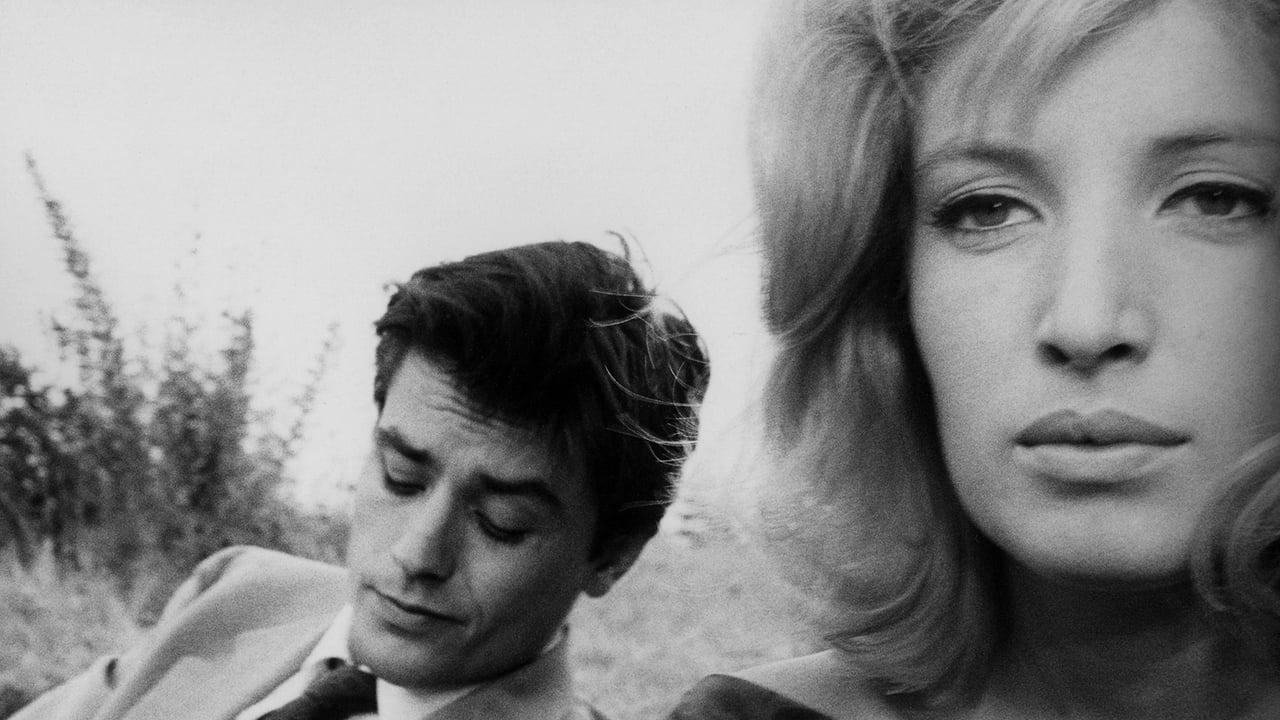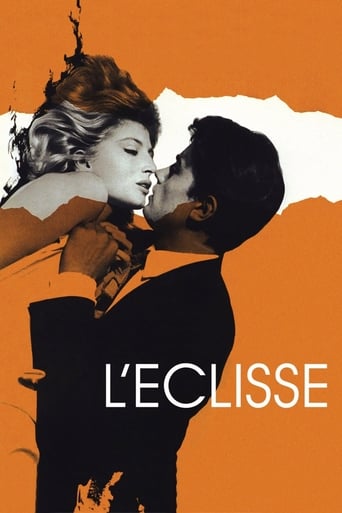

What makes it different from others?
... View Moreridiculous rating
... View Morejust watch it!
... View MoreBlending excellent reporting and strong storytelling, this is a disturbing film truly stranger than fiction
... View MoreI can only wonder how a country like Italy, which experienced such enormous loss of life and property in World War II, 17 years later was willing to finance a large number of complex and intelligent films like L'ECLISSE, which could not possibly do well at the box office.It is sad to see that the reflective, thoughtful movie is basically extinct these days, even in Italy, that land of culture, knowledge and beauty. It is, above all, a sad comment on the human mind which, at the zenith of its technological knowledge, is sadly losing touch with cinema that addresses inner issues such as L'ECLISSE does, namely the vagaries of love hand in hand with the thirst for materialism and sex, and the inexorable passing of time.Alain Delon is excellent in his portrayal of a stock exchange broker who, as Victoria (Vitti) points out, does not stop still but is constantly doing something to make money or to satisfy his lust. Vitti is beautiful and elegant beyond words, but never seems satisfied with those who fall in love with her, just as her mother is never satisfied with the money she makes - and loses - at the Stock Exchange. Love is as beyond reach for Vittoria as distant Kenya and the snows on the Kilimanjaro.Photography is superlative (especially the chiaroscuro of the more intimate moments between the leads); screenplay is solid enough to prevent the film sliding into pretentiousness, and to keep you interested, right up to the completely original and unique ending, reflecting the essence of life in all its indifference, inevitability - and passing of time.Early in the movie, there is a sequence at Verona aerodrome, Verona being the town of Romeo and Juliet. L'ECLISSE is nowhere near as tragic... but, as the saying goes, all is fair in love and war.Excellent as the two leads and supporting cast are, direction is sublime, allowing the spectator to sense the dynamics of relationships, and fill the gaps. Antonioni's direction shows him at the top of his considerable skills - only BLOW-UP would be (marginally) better.Naturally, in this age of constant change and fast tracking, few would waste time on a thought-provoking film - which is a pity, as it is bound to further erode the audience's level of exigency, and the quality of current movie-making.Grazie mille, Michelangelo!
... View More"Love" in modern society has always been a major point in Antonioni films, especially on his unofficial trilogy about Alienation (L'avventura, La Notte and L'eclisse)and his first color film "Red Desert", as well human loneliness, their emotional distance and futility is again amazingly represented in the last part of trilogy with "L'eclisse". At the surface, "L'eclisse" is one of Antonioni's simplest films, but it's not in the surface that makes the film so complex, but really in what is add on in the scenes. Vittoria (Monica Vitti) is a tired young woman that after ending her presumed failed relationship with Riccardo (Francisco Rabal) tries to search for a true relationship. The beginning shows us a great drama: a couple (Vittoria and Riccardo) who can no longer communicate with each other, the affection left between them is little, almost none, there is only left that great and agonizing silence which shows nothing positive about their relationship. Then later she tries to keep a relationship with Piero (Alain Delon) but their relationship itself already seems failed and empty, it seems more an attempt to fulfill their loneliness and emptiness. She, differently from the other characters of the film doesn't accept her failed relationship with men, her mother and even herself, which drives Vittoria in her endless and doomed journey trying to search for herself and affection. The film is realistic, and at the same time strangely surreal, like if a force of nature was directing the film (especially the character of Vittoria), wind blows and trees becomes in certain points of the film essential. Every scene, every object gains symbolism and a special importance in the film (as in practically all Antonioni films). Now coming to the extraordinary end sequence, which is easily one of the greatest in cinema history. Images of the locations were the main characters were, these haunting and strangely scary scenes shows us many things, one of them being human's eclipse, we see buildings and many manifestations of humans existence but yet we can not feel them, they seem cold, distant and bleak, as humans tend to be nowadays. Now the eclipse of human's emotion has finally (and unfortunately) happen.
... View MoreThis is the last of Antonioni's Incomunicability trilogy that began with "La Notte," "Avventura," "La Notte," and finally "L'Ecclisse," (The eclipse).Normally I have a problem with this kind of film. They move slowly, seem to be style over substance, and pretentious. "L'Ecclisse" is an exception in that it really is saying something.Knowing Antonioni's point of view gives some insight as to what's behind "L'Ecclisse." We cannot make a real connection with another person due to too much technology. We cannot connect any longer to the natural world and are doomed to be out of tune with it now. The beginning of this film is almost completely free of dialogue. Vittoria (Monica Vitti) and her fiancée, Riccardo, have been up all night discussing their relationship. She no longer loves him, but she can't tell him why.Vittoria visits her mother, who hangs out most days at the stock exchange in Rome. There she meets her mother's stockbroker, Piero (Alain Delon), a handsome, ambitious young man. They are attracted to one another, though he wants to act on it and she resists. Eventually she gives in. They are opposites. She is quiet, mysterious, and confused; he is part of the modern world, talkative, ambitious, and busy.Images are important -- images of modern life, new buildings, the Stock exchange, and primitive images, Vitti's dance, the dead plant. It all culminates in the final sequence. L'Eclisse is unlike a typical film in its emphasis on the discontentedness of modern life and its nontraditional approach. It may be hard to adjust to. But if you can, it's well worth it.
... View MoreVittoria is dissatisfied with love. With life. With the world. She stands before us in a slinky black dress, her white blonde hair afraid of another tease, her cat eyes worried they might look the other way and find yet another object that brings no happiness. A light breeze hits her ethereally beautiful composure, idling from an electric fan that can barely suppress the unbearable heat that has consumed the neighborhood. She wanders around the room like a fashion model clamoring for a good shot, only to promptly lie down on a feathery sofa in protest. As she regains the strength to pick herself back up, she walks over to her older lover with magnetic intent. They talk. They stare at each other in silence. "I'm leaving," Vittoria announces. A few moments go by. Vittoria wants to explain herself — she wishes she could deliver yet another "it's not you, it's me" spiel — but she can't. She doesn't know what she wants, she doesn't know if love is enough, and she sure as hell doesn't know how to explain the emptiness she feels in such a repetitive continuum. But she knows one thing; one more minute of her current life and she might scream her lungs out into a vacant room. Michelangelo Antonioni has a blunt fascination with dissolution, disappearance, and death: in his L'Avventura, a woman simply vanishes into thin air after a boating trip to a remote island. In 1966's Blowup, a dead body is discovered in a park through a series of voyeuristic photos; problem is, the entire crime may just be an illusion. L'Eclisse is a labyrinth of silence and oppression where you can't quite grasp your motives and temptations. Communication only seems to be comfortable when within the barriers of small-talk and flirtations. Everything is so materialistic that if you suddenly died of a heart attack, everyone would gasp for vivid emphasis but turn around and continue self-serving without mourning for a minute. L'Eclisse has the optimism of a cynical teenager, questioning if life really matters and if romance really can make all the difference. It's enormously heavy stuff, and Antonioni ices a rich drizzling of alienation and isolation with the craftsmanship of a master chef. A luminous Monica Vitti portrays Vittoria with such warm-blooded specificity that the coldness of her mental state comes by as a surprise. She is slowly losing the carefree euphoria of her youth, and is beginning to wonder if life, as repetitive as it is, is all that it's cracked up to be. After breaking up with her long-time lover, she begins to find herself attracted to Piero (an always charismatic Alain Delon), a younger stockbroker that emanates confidence and fortunately lacks the acumen that made her former partner such an unwavering bore. It doesn't take long before they embark on a blazing affair, but even with lingering infatuation on their side, they are confronted with their innermost fears, hurting their chances of lasting love.L'Eclisse is not so much a love story as it is an expression of loneliness; the central characters want their hesitations to come to an end, but they can't seem to find themselves fulfilled in any direction they go. As children, they were told that love and marriage and kids and a big house were all you needed to find happiness, but as they age, it becomes increasingly clear that such elementary ideas are merely a distraction, not a solution.Antonioni can't answer the questions he poses with such ardor, but he asks them so convincingly that it proves to be impossible to finish the film without a feeling of despair at the pit of your stomach. The conclusion, which finds both characters alone and out of the picture, is simply a series of city shots that rattle with a stirringly desolate ambiance. It's a courageous way to end a film, but it only deepens what Antonioni was going for already. What if love doesn't matter? What if life doesn't matter? What if we're alone for the rest of our lives? Will anyone care? If sexy stars like Monica Vitti and Alain Delon can't lose themselves in a syrupy love story that tricks us into thinking that the world isn't a cruel place, then who can? L'Eclisse is not for the faint of heart, but if you give it a chance, you'll find yourself experiencing feelings you never thought you'd feel before.Read more reviews at petersonreviews.com
... View More